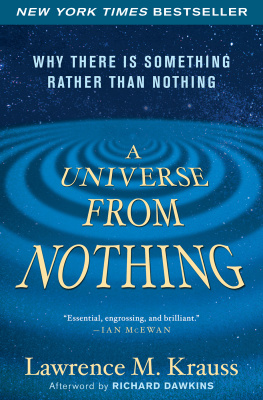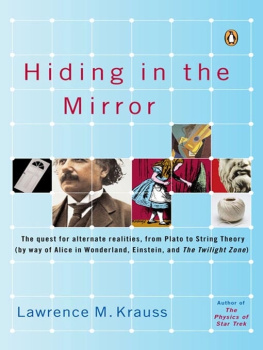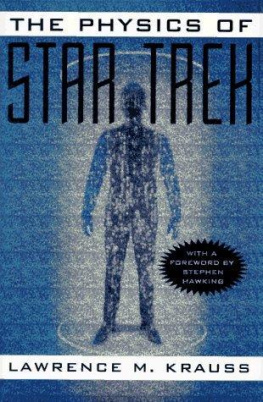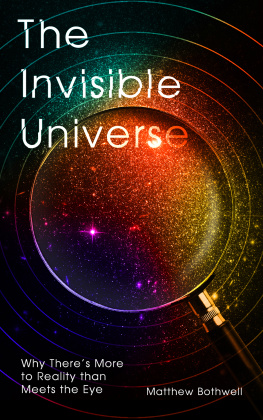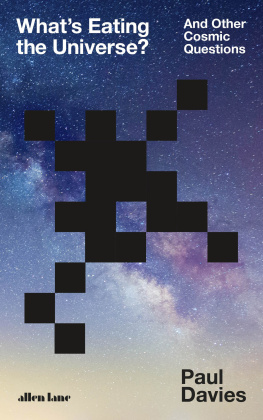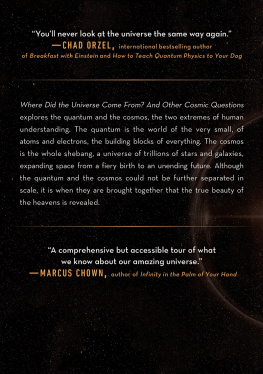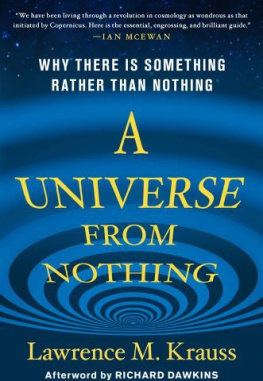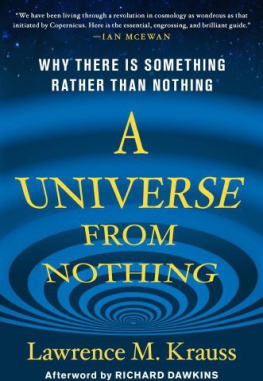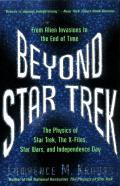P REFACE TO THE P APERBACK E DITION
Since the hardcover version of this book first appeared, a visceral negative reaction among some commentators to the very idea of a universe arising from nothing has been balanced by a major scientific discovery that supports this possibility. The confirmation of the Higgs boson refines our understanding of the relationship between seemingly empty space and our existence. I want to elaborate on both the Higgs boson and the negative reactions to A Universe from Nothing in this new preface.
When I chose to subtitle this book Why There Is Something Rather Than Nothing , I wanted to connect the remarkable discoveries of modern science to a question that has fascinated theologians, philosophers, natural philosophers, and the general public for more than two millennia. But I wasnt fully aware of how my choice of words might lead to the same kind of confusion that occurs whenever one says in public that Evolution is a theory .
In popular parlance, theory means something very different from its scientific sense. So too nothing is a hot-button issue for some people, a line in the sand that some people are not willing to cross, so that even using the word, just as using the word God , can be so polarizing that it obfuscates more important issues. A similar remark can be made about the question Why?: using why and nothing together can be as explosive as mixing diesel fuel and fertilizer.
In chapter 9 of this book I mention a fact that I now want to introduce first here. Whenever one asks Why? in science, one actually means How?. Why? is not really a sensible question in science because it usually implies purpose and, as anyone who has been the parent of a small child knows, one can keep on asking Why? forever, no matter what the answer to the previous question. Ultimately, the only way to end the conversation seems to be to say Because!
Science changes the meaning of questions, especially why-like questions, as it progresses. Here is an early example of this fact, which illustrates a number of features in common with the more recent revelations I treat in this book.
The renowned astronomer Johannes Kepler claimed in 1595 to have had an epiphany when he suddenly thought he had answered a profoundly important why question: Why are there six planets? The answer, he believed, lay in the view of the five Platonic solids, those sacred objects from geometry whose faces can be composed of regular polygonstriangles, squares, etc.and that could be circumscribed by spheres whose size would increase as the number of faces of the solid increased. If these spheres then separated the orbits of the six known planets, he conjectured, perhaps their relative distances from the sun and the fact that there were just six of them could be understood as revealing, in a profound and deep sense, the mind of God, the mathematician. (The idea that geometry was sacred goes back as far as Pythagoras.) Why are there six planets?then, in 1595was considered a meaningful question, one that revealed purpose to the universe.
Now, however, we understand the question is meaningless. In the first place, we know there are not six planets, there are nine planets. (Pluto will always be a planet for me. Not only do I like to annoy my friend Neil deGrasse Tyson by so insisting, but my daughter did her fourth-grade science project on Pluto, and I dont want that to have been in vain!) More important, however, we know our solar system is not unique, which Kepler and his era did not know. More than two thousand planets orbiting other stars have been discovered (by a satellite named Kepler, coincidentally!).
The important question then becomes not Why ? but How does our solar system have nine planets? (or, eight planets, depending upon your count). Since clearly lots of different solar systems exist, with very different features, what we really want to know is how typical we are, what specific conditions might have existed allowing our solar system to have four rocky planets closest to the sun, surrounded by a number of far larger gas giants. The answer to this question might shed light on the likelihood of finding life elsewhere in the universe, for example.
Most important, however, we realize that there is nothing profound about six (or eight or nine), nothing that points to purpose or design... no evidence of purpose in the distribution of planets in the universe. Not only has why become how but why no longer has any verifiable meaning.
So too, when we ask Why is there something rather than nothing? we really mean How is there something rather than nothing? This brings me to the second confusion engendered by my choice of words. There are many seeming miracles of nature that appear so daunting that many have given up trying to find an explanation of how we came to be and, instead, blame it all on God. But the question I really care about, and the one that science can actually address, is the question of how all the stuff in the universe could have come from no stuff, and how, if you wish, formlessness led to form. That is what seems so astounding and nonintuitive. It seems to violate everything we know about the worldin particular the fact that energy in its various forms, including mass, is conserved. Common sense suggests that nothing, in this sense the absence of something, should have zero total energy. Therefore, where did the 400 billion or so galaxies that make up the observable universe come from?
The fact that we need to refine what we mean by common sense in order to accommodate our understanding of nature is, to me, one of the most remarkable and liberating aspects of science. Reality liberates us from the biases and misconceptions that have arisen because our intellects evolved through our animal ancestors, whose survival was based on whether predators might lurk behind trees or in caves and not on understanding the wave function of electrons in atoms.
Our modern conception of the universe is so foreign to what even scientists generally believed a mere century ago that it is a tribute to the power of the scientific method and the creativity and persistence of humans who want to understand it. That is worth celebrating. As I describe in this book, the question and the possible answers to how something might come from nothing are even more interesting than merely the possibility of galaxies manifesting from empty space. Science provides a possible road map for the creation of space (and time) itselfand perhaps also an understanding of how the laws of physics that govern the dynamics of space and time can arise haphazardly.
For many people, however, the fascinating possible resolutions of these age-old mysteries are not sufficient. The deeper question of nonexistence overwhelms them. Can we understand how absolute nothingness, without even the potential for anything at all to exist, does not still reign supreme? Can one ever say anything other than the fact that the nothing that became our something was a part of something else, in which the potential for our existence, or any existence, was always implicit?
In the book I take a rather flippant attitude toward this concern, because I dont think it adds anything to the productive discussion, which is What questions are actually answerable by probing the universe? I have discounted this philosophical issue, but not because I think those people who occupy themselves with certain aspects of it are not trying hard to define logical questions. Rather, I discount this aspect of philosophy here because I think it bypasses the really interesting and answerable physical questions associated with the origin and evolution of our universe. No doubt some will view this as my own limitation, and maybe it is. But it is within that context that people should read this book. I dont make any claims to answer any questions that science cannot answer, and I have tried very carefully within the text to define what I mean by nothing and something. If those definitions differ from those you would like to adopt, so be it. Write your own book. But dont discount the remarkable human adventure that is modern science because it doesnt console you.

